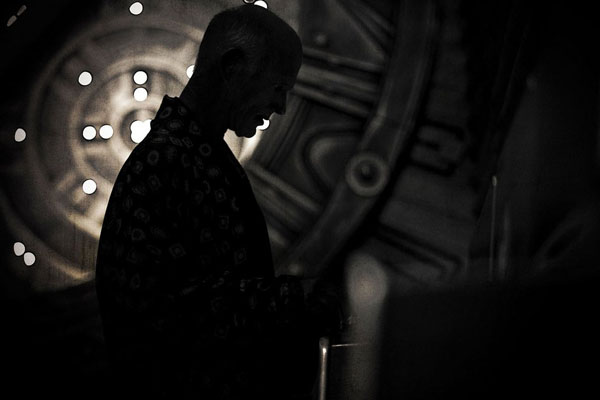The latest piece in the Notebook, bylined Uncas Blythe, takes on “the holy clichés of auteurism” before tracking the rise and fall of Auteurism 2.0 and Auteurism 3.0 (“Auteurism 4.0 is more or less what we have now”) and outlining “with honest sympathy, what I see as the preferable early beatitudes of vulgar auteurism.” Firecrackers are lit and tossed throughout, but the crux seems to be right about here:
Auteurism is an orthodoxy of the avant-garde, dedicated to sacred canon building in the age of its mechanical reproducibility. Fundamentally, vulgar auteurism, or whatever they shall call it, is about watching and really seeing, and showing care for the movies of people who precisely don’t have auteur status. The hopeless, the unheroic. There is an obvious honking contradiction in the celebration of marginal filmmakers as marginal. But that doesn’t mean that the protective impulse that comes from chancing upon something secretly beautiful isn’t laudably present. So the term VA is fundamentally wrongheaded, if not an oxymoron. Because after all, once a filmmaker has been properly “authorized” then there is no chance of their work being seen in its actual, ugly and hairy phenomenology.
“An intimate, even cosy valedictory chronicle of how one of recent cinema’s most austerely uncompromising major films reached the screen, Tarr Bela – I Used to Be a Filmmaker is catnip for serious cinephiles,” writes Neil Young in the Hollywood Reporter. “Evidently granted all-areas access to the remote Hungarian locations where 2011’s The Turin Horse was shot, young French anthropologist/director Jean-Marc Lamoure has crafted a respectfully observational, accessible documentary.”
“Do you ever wonder about those flocks of computer-generated birds flitting across the screens of so many of your favorite shows and films?” Brian Thill does. His piece for the Atlantic is not, as you might expect, about how they’re generated, but rather, why.
“Indians are fond of observing centenaries and anniversaries with misplaced sense of history and facts,” writes Gopalan Ravindran for Wide Screen. “This becomes more glaring when the Indian government takes the lead as a pied piper in pushing wrongly positioned centenaries and anniversaries and the Indian media gets greedy to get more advertisement revenue and easy content as eager beaver/hungry rats.” In short, Ravindran is not buying into the idea of 2013 marking 100 years of Indian cinema.
John Fawcett’s Ginger Snaps (2001) “might just be… the greatest werewolf and menstruation-themed feminist horror movie of all time,” writes Alice Bolin in the Los Angeles Review of Books.
Fred Zinnemann’s From Here to Eternity has just turned 60, and, for the BFI, Samuel Wigley looks back on the beach scene, “one of the Golden Age’s most memorably erotic encounters.”
At Slate, David Haglund notes that when Sigourney Weaver recently announced that James Cameron would soon begin shooting three sequels to Avatar, the news was greeted with “a collective shrug… Ali Arikan went so far as to request an essay about how Avatar, ‘the most successful film in history, has left nary a blip on pop-culture.’ An essay is beyond my scope here,” writes Haglund, but he does have a few ideas.
In other news. Now that that The Weinstein Company has acquired international rights to Snowpiercer, Harvey wants to cut 20 minutes from Bong Joon-ho’s film before it sees “the light of day in North America, South Africa, Australia, New Zealand, or the UK,” reports Pierce Conran in Twitch. “According to film critic and programmer Tony Rayns ‘TWC people have told Bong that their aim is to make sure the film “will be understood by audiences in Iowa … and Oklahoma.”’ Effectively, the notorious Hollywood executive believes the American mid-west is too stupid for Snowpiercer.” Conran argues that Bong’s film “doesn’t have a great deal of flab which could easily be cut out. However, it is a very dark film, which may explain why the demanded cuts are so significant. If they happen where I think they will, much of what makes this film so special will be lost.”
“News broke Monday that Republican National Committee Chairman Reince Priebus is calling on NBC and CNN to scrap plans to film documentaries about Hillary Clinton,” reports Aaron Blake for the Washington Post. “If they don’t, Priebus said, he will seek a binding resolution at the RNC’s meeting next week preventing the party from participating in any debates sponsored by the two networks—a pretty significant threat.”
New York. “A series like MoMA’s Focus on South Korea is helpful for giving us an opportunity to see the nation’s directors who haven’t yet become festival darlings or attracted American distribution but might get there one day,” writes Steve Erickson for Gay City News. The Focus is on through Sunday.
In the works.
A new film by Vincent Gallo — APRIL, co-starring James Ira Gurman (birth name of deceased porn star Jamie Gillis): http://t.co/wZ790VipXW
— C. Mason Wells (@cmasonwells) August 5, 2013
Ed Harris is boarding Michael Almereyda’s adaptation of Shakespeare’s Cymbeline with Ethan Hawke, reports Justin Kroll in Variety.
For news and tips throughout the day every day, follow @KeyframeDaily on Twitter and/or the RSS feed. Get Keyframe Daily in your inbox by signing in at fandor.com/daily.






